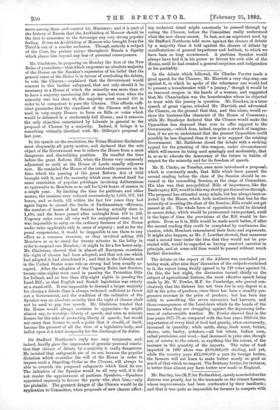Sir Stafford Northcote's reply was very temperate, and, indeed, hardly
gave the impression of genuine personal convic- tion that closure of debate by a majority is really dangerous. He insisted that safeguards are of no use, because the popular dictation which overrides the will of the House in order to impose such a Standing Order as the Closure, will always be able to override the proposed safeguards which limit its use. The initiative of the Speaker would be all very well, if it did not render the appointment of partisan Speakers,—Speakers appointed expressly to favour the party who elect him,—only too probable. The greatest danger of the Closure would be its application to Committee, when proposals of new clauses affect-
ing technical detail might constantly be pressed through by voting the Closure, before the Committee really understood what the new clause meant. In fact, not an argument used by Sir Stafford Northcote told more against the closure of debate by a majority than it told against the closure of debate by manifestations of general impatience and hubbub, to which we have been so long accustomed. A partisan Speaker would always have had it in his power to favour his own side of the House, until he had created a general suspicion And indignation at his partiality.


































 Previous page
Previous page